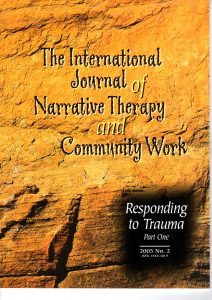 Dear Reader,
Dear Reader,
There has been considerable anticipation in relation to publishing this journal and the next one, both of which focus on the theme ‘Responding to Trauma’. We have been really involved in discussions around this topic over the last nine months. It feels great to be finally sending this first selection of papers to you.
Since the events of September 11th in the USA, the field of ‘trauma work’ has grown exponentially. This increased interest in these matters seems to offer many possibilities as well as a range of hazards! There is so much to consider. Some of the questions that are considered in this issue include:
– The concept of trauma de-briefing has been the focus of considerable debate in recent years. Are there ways in which narrative ideas can be helpful when meeting with people who have recently experienced trauma?
-Understandings about trauma and trauma work that have been developed in western countries are now being ‘exported’ across cultures. What are the implications of this, and how can care be taken not to replicate forms of psychological colonisation?
-How can workers understand their experiences in this area? Notions of ‘vicarious trauma’ are now commonplace and it is regularly assumed that therapists and counsellors can become traumatised themselves by witnessing stories of trauma. Are there alternative ways of understanding and responding to workers’ experience?
-What are some of the considerations when working with a heterosexual couple in which both partners have experienced trauma? • When therapists, or their loved ones, experience significant trauma themselves, how does this influence their work.
-Little attention has been paid to the experience of those who have been subject to rape and/or sexual violence within prisons. What would a support package for prisoner rape survivors look like?
-How can practitioners respond to communities who have experienced trauma related to war and conflict? How can ‘narrative theatre’ approaches be used in this work?
The papers included here describe work in Sri Lanka in relation to the tsunami, Australia, Israel, Uganda, Burundi, East Congo and Gaza (Palestinian Territories). In this issue, we’ve also included two papers on a different theme. These relate to work with children. One of these papers describes work from Bangladesh. The other relates to work that took place in Australia.
We would be very interested to hear your reflections and feedback on this journal issue. We look forward to hearing from you.
Warm regards,
Cheryl White & David Denborough
P.S. We would like to acknowledge the following people who have acted as readers and reviewers of papers in this journal: Norma Akamatsu, Chris Behan, Walter Bera, Pennie Blackburn, Maggie Carey, John Cramer, Saviona Cramer, David Epston, Gary Foster, Andrew Groome, Vanessa Jackson, Zoy Kazan, Natasha Kis-Sines, Tracey Laszloffy, Rick Maisel, David Moltz, Ron Nasim, David Newman, Margaret Newmark, Amaryll Perlesz, Amanda Redstone, Colin Riess, Mary Pekin, Ruth Pluznik, Bruria Rosenwaks, Shona Russell, Margaret Ryan, Yishai Shalif, Olga Silverstein, Jane Speedy, Lovisa Stannow, John Stillman, Gaye Stockell, Manja Visschedijk, Ruth Walter, Kaethe Weingarten, Michael White, Angel Yuen and Jeff Zimmerman.

 Dear Reader,
Dear Reader,